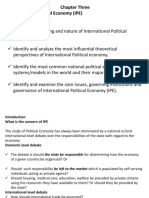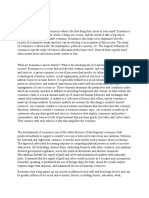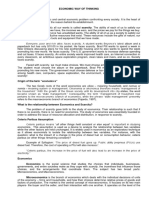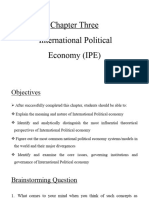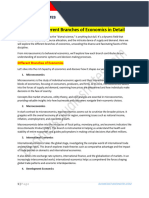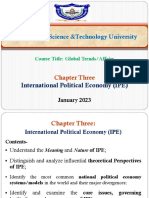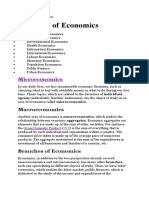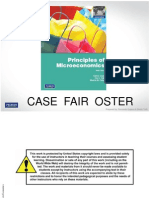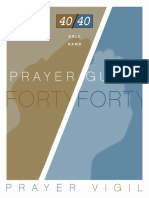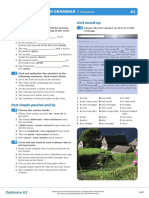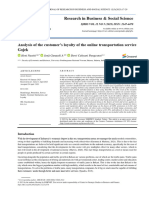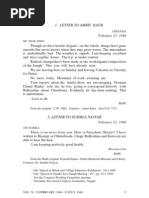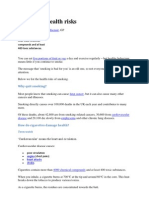Diverse Field of Economics
Diverse Field of Economics
Uploaded by
Kim Celestino LingadCopyright:
Available Formats
Diverse Field of Economics
Diverse Field of Economics
Uploaded by
Kim Celestino LingadCopyright
Available Formats
Share this document
Did you find this document useful?
Is this content inappropriate?
Copyright:
Available Formats
Diverse Field of Economics
Diverse Field of Economics
Uploaded by
Kim Celestino LingadCopyright:
Available Formats
Prepared by: Dionne Cortez
Comparative Economic Systems examines the ways alternative economic systems function. This talks about the advantages and disadvantages of different systems. Econometrics applies statistical techniques and data to economic problems in an effort to test hypotheses and theories. Economic development focuses on the problems of low-income countries. This talks about what can be done to promote development in these nations. Important concerns of development economists include population growth and control, provision for basic needs, and strategies for international trade.
Economic History traces the development of the modem economy. This covers what economic and political events and scientific advances that caused the Industrial Revolution. This explains the tremendous growth and progress of post World War II Japan and what caused the Great Depression of the 1930s. Economics of Race & Gender examines the role of race and gender in economic theory, in economic life, and in policy making. It answers how has discrimination by race or gender affected the well-being of households and the distribution of income and wealth. Environmental Economics studies the potential failure of the market system to account fully for the impacts of production and consumption on the environment and on natural resource depletion.
Finance examines the ways in which households and firms actually pay for, or finance, their purchases. It involves the study of capital markets (including the stock and bond markets), futures and options, capital budgeting, and asset valuation. The History of Economic Thought which is grounded in philosophy, studies the development of economic ideas and theories over time, from Adam Smith in the eighteenth century to the works of economists such as Thomas Malthus, Karl Marx, and John Maynard Keynes. Because economic theory is constantly developing and changing, studying the history of ideas helps give meaning to modem theory and puts it in perspective. Industrial Organization looks carefully at the structure and performance of industries and firms within an economy. How do businesses compete? Who gains and who loses?
International Economics studies trade flows among countries and international financial institutions. Talks about the advantages and disadvantages for a country that allows its citizens to buy and sell freely in world markets. Also why the dollar is strong or weak. Labor Economics deals with the factors that determine wage rates, employment, and unemployment. It answers: How do people decide whether to work, how much to work, and at what kind of job? How have the roles of unions and management changed in recent years? Law & Economics analyzes the economic function legal rules and institutions. How does the law change the behavior of individuals and businesses? Do different liability rules make accidents and injuries more or less likely? What are the economic costs of crime?
Public Economics examines the role of government in the economy. What are the economic functions of government, and what should they be? How should the government finance the services that it provides? What kinds of government programs should confront the problems of poverty, unemployment, and pollution? What problems does government involvement create? Urban & Regional Economics studies the spatial arrangement of economic activity. Why do we have cities? Why are manufacturing firms locating farther and farther from the center of urban areas?
You might also like
- Banking Segmentation Case StudyDocument1 pageBanking Segmentation Case StudySourav Aggarwal0% (1)
- Chapter Three International Political Economy (IPE)Document9 pagesChapter Three International Political Economy (IPE)gebregziabher100% (9)
- Consumers, Producers, and The Efficiency of Markets: Multiple ChoiceDocument11 pagesConsumers, Producers, and The Efficiency of Markets: Multiple Choiceboywonder1990No ratings yet
- Computer Assignment On Computerization in BangladeshDocument13 pagesComputer Assignment On Computerization in BangladeshSuvro AvroNo ratings yet
- 3.1 Experiment No.:03 3.2 Experiment Name: Experimental Study of 8 Bit Subtraction, Multiplication, and Division and GetDocument7 pages3.1 Experiment No.:03 3.2 Experiment Name: Experimental Study of 8 Bit Subtraction, Multiplication, and Division and GetArafat Hossain Akash0% (1)
- Risk Management in Commercial BanksDocument6 pagesRisk Management in Commercial BanksAman AgarwalNo ratings yet
- ECON 203 Week 1Document33 pagesECON 203 Week 1prpldreamNo ratings yet
- Economic DisciplineDocument3 pagesEconomic DisciplineKent BacomoNo ratings yet
- Principles of Economics and Bangladesh EconomyDocument6 pagesPrinciples of Economics and Bangladesh EconomyZonal office ChapainawbagnajNo ratings yet
- Lecture Note in EconomicsDocument3 pagesLecture Note in EconomicsJohn Remmel RogaNo ratings yet
- Chapter 3 GlobalDocument63 pagesChapter 3 GlobalTesfamariam Setargew MesfinNo ratings yet
- Week 1 INTRODUC-WPS OfficeDocument5 pagesWeek 1 INTRODUC-WPS OfficeGanawoshi NGNo ratings yet
- Development EconomicsDocument5 pagesDevelopment EconomicsReal Mae PeñaNo ratings yet
- Success Is A Journey Not A Destination Inspirational Speech FTDocument2 pagesSuccess Is A Journey Not A Destination Inspirational Speech FTGeorgeNo ratings yet
- Week 1Document35 pagesWeek 1Pushkar RajNo ratings yet
- Economic System Production Distribution Trade Consumption Goods ServicesDocument3 pagesEconomic System Production Distribution Trade Consumption Goods ServicesJam Knows RightNo ratings yet
- Business and Ethics Week 4Document32 pagesBusiness and Ethics Week 4Umer IrfanNo ratings yet
- H L Ahuja Book Chap. 1 - 2Document9 pagesH L Ahuja Book Chap. 1 - 2archana.rosuNo ratings yet
- Business and Ethics Week 4Document30 pagesBusiness and Ethics Week 4Umer IrfanNo ratings yet
- What Is EconomicsDocument3 pagesWhat Is EconomicsHifazat FaruquiNo ratings yet
- Explain The Different Branches of Economics in DetailDocument4 pagesExplain The Different Branches of Economics in DetailExport ImbdNo ratings yet
- Economics: Case Fair OsterDocument29 pagesEconomics: Case Fair OsterGear Arellano IINo ratings yet
- Microeconomics Compilation of Reports Midterms Bsed SS2Document45 pagesMicroeconomics Compilation of Reports Midterms Bsed SS2Jack Daniel BalbuenaNo ratings yet
- introduction-to-EconomicsDocument2 pagesintroduction-to-Economicsanastasialee669No ratings yet
- ECON1101 Coursework AssignmentDocument7 pagesECON1101 Coursework AssignmentMiki MehreteabNo ratings yet
- Chapter ThreeDocument40 pagesChapter ThreedejannegesaNo ratings yet
- Lecture Notes - Basic Economics 1Document6 pagesLecture Notes - Basic Economics 1lei_sangabrielNo ratings yet
- Introduction To Economics & Macroeconomics: Dr. A K M Nazrul Islam Adjunct Associate ProfessorDocument14 pagesIntroduction To Economics & Macroeconomics: Dr. A K M Nazrul Islam Adjunct Associate ProfessorTanni BaruaNo ratings yet
- Introduction To Economics & Basics of Macroeconomics: Dr. A K M Nazrul Islam Adjunct Associate ProfessorDocument14 pagesIntroduction To Economics & Basics of Macroeconomics: Dr. A K M Nazrul Islam Adjunct Associate ProfessorMd ArifuzzamanNo ratings yet
- ScarcityDocument3 pagesScarcityserahjames225No ratings yet
- EconomicsDocument3 pagesEconomicstomislav.krsic24No ratings yet
- Economics of This WorldDocument5 pagesEconomics of This Worldsahil2478No ratings yet
- Macro Economics For Business Decisions.Document16 pagesMacro Economics For Business Decisions.VrkNo ratings yet
- 4 6028325459970756196 PDFDocument34 pages4 6028325459970756196 PDFYared100% (1)
- Branches of EconomicsDocument8 pagesBranches of Economicsralph andrew marcalinasNo ratings yet
- The Big Picture Chpt 1Document2 pagesThe Big Picture Chpt 1Kate YatiNo ratings yet
- Chapter 1Document14 pagesChapter 1HayamnotNo ratings yet
- Hamza EcoDocument3 pagesHamza Ecobalochhasham2002No ratings yet
- CHAPTER-3 Global TrendsDocument75 pagesCHAPTER-3 Global TrendsCherenet TomaNo ratings yet
- Global Trends CH 3Document14 pagesGlobal Trends CH 3mavimarvelous033No ratings yet
- AEREDR3Document1 pageAEREDR3fovome2659No ratings yet
- The Concept of ScarcityDocument9 pagesThe Concept of ScarcityJayson LlamasaresNo ratings yet
- What Is Economics & Why Do We Study ItDocument2 pagesWhat Is Economics & Why Do We Study Itstevelarwin6No ratings yet
- Unit 1 - (1) - Principles of MicroeconomicsDocument26 pagesUnit 1 - (1) - Principles of Microeconomicsishika.sharma15080No ratings yet
- Lecture Notes of Principles Building EconomicsDocument210 pagesLecture Notes of Principles Building EconomicsIshimwe oliveNo ratings yet
- End of Semester 1 DVS1106 Marking Guide-December 2017Document20 pagesEnd of Semester 1 DVS1106 Marking Guide-December 2017felixambereNo ratings yet
- Chapter 1. - EconomicsDocument5 pagesChapter 1. - EconomicsNaragsak A PabuyaNo ratings yet
- A. A. The Twin Themes of Economics: Scarcity and EfficiencyDocument19 pagesA. A. The Twin Themes of Economics: Scarcity and EfficiencyIrenej Krayewsky100% (1)
- BBA Managerial Economics Sem I Module 1Document16 pagesBBA Managerial Economics Sem I Module 1tto29728No ratings yet
- Intro To EconomicsDocument10 pagesIntro To Economics28mingyuanNo ratings yet
- MODULE1 Soc Sci. 15Document11 pagesMODULE1 Soc Sci. 15Johanah TenorioNo ratings yet
- CFO10e Ch01 Micro GEDocument37 pagesCFO10e Ch01 Micro GEEmile DaouNo ratings yet
- International Political Economy (Ipe)Document52 pagesInternational Political Economy (Ipe)Fiseha GetachewNo ratings yet
- Global Trends Chapter 3 2Document23 pagesGlobal Trends Chapter 3 2jovannnn16No ratings yet
- HLTECN PrelimsDocument7 pagesHLTECN PrelimsPete SafawilNo ratings yet
- İkti̇sat Vi̇zeDocument21 pagesİkti̇sat Vi̇zeDilara SakaryaNo ratings yet
- What Is EconomicsDocument33 pagesWhat Is EconomicsCryzZNo ratings yet
- THEORIES IN IPE (SECOND NOTES)Document112 pagesTHEORIES IN IPE (SECOND NOTES)axmedfrx97No ratings yet
- Economics AssignDocument17 pagesEconomics Assignwende924No ratings yet
- Lecture 1 Introduction To EconomicsDocument3 pagesLecture 1 Introduction To Economicsobielta2022No ratings yet
- Essential of Studying EconomicsDocument2 pagesEssential of Studying EconomicsNorlaila amerodenNo ratings yet
- Methods of ResearchDocument28 pagesMethods of ResearchSarmiento B. FredNo ratings yet
- 40 40PrayerGuideERLC NAMB PDFDocument46 pages40 40PrayerGuideERLC NAMB PDFchintengoNo ratings yet
- JSS InstructionsDocument2 pagesJSS InstructionsJust MeNo ratings yet
- Handout 2Document36 pagesHandout 2xandra joy abadezaNo ratings yet
- Hall v. Clifton PrecisionDocument10 pagesHall v. Clifton Precisionchris_dizeNo ratings yet
- Employee Card Activity ListDocument47 pagesEmployee Card Activity ListMohammadNo ratings yet
- Chapter 1 Business Activities and The Legal EnvironmentDocument42 pagesChapter 1 Business Activities and The Legal EnvironmentaefjiNo ratings yet
- Business Maths - BBA - 1yr - Unit 3Document141 pagesBusiness Maths - BBA - 1yr - Unit 3ADISH JAINNo ratings yet
- Amazing Architecture: ReadingDocument16 pagesAmazing Architecture: Readingadux_07No ratings yet
- Speaking TestDocument3 pagesSpeaking TestJonathan SeagullNo ratings yet
- Abutment Selection in Fixed Partial Denture: Shivakshi Chansoria, Harsh ChansoriaDocument9 pagesAbutment Selection in Fixed Partial Denture: Shivakshi Chansoria, Harsh ChansoriaAbdelmotalibNo ratings yet
- Kozicka 2008 PHD en LowresDocument332 pagesKozicka 2008 PHD en LowresDemetrius CioncaNo ratings yet
- OPT A2 U12 Grammar Standard PDFDocument1 pageOPT A2 U12 Grammar Standard PDFOksana DorNo ratings yet
- Literary GenresDocument56 pagesLiterary GenresOtencianoNo ratings yet
- My Writing Notebook: Mastering HandwritingDocument16 pagesMy Writing Notebook: Mastering HandwritingLaura ToporNo ratings yet
- Some Notes On Semantics and SLI: September 2010Document15 pagesSome Notes On Semantics and SLI: September 2010Edificator BroNo ratings yet
- KETO Diet Chart... Simple LifeDocument6 pagesKETO Diet Chart... Simple LifeSayan MondalNo ratings yet
- Analysis of The Customers Loyalty of The Online TDocument13 pagesAnalysis of The Customers Loyalty of The Online Twisnu handokoNo ratings yet
- 2RDocument10 pages2RUmmetNo ratings yet
- Psychiatric Patient and AnaesthesiaDocument7 pagesPsychiatric Patient and AnaesthesiaWahyu Permata LisaNo ratings yet
- Problems Encountered, Coping Mechanism and Behavioral Changes of Selected Internally Displaced Meranaw High School StudentsDocument7 pagesProblems Encountered, Coping Mechanism and Behavioral Changes of Selected Internally Displaced Meranaw High School StudentsMC FototanaNo ratings yet
- Chapter 2 - Past, Present, Future Perfect TenseDocument2 pagesChapter 2 - Past, Present, Future Perfect TenseRika Rahayu NingsihNo ratings yet
- Reply On Behalf of The Respondent Under Section 12 of Protection of Women From Domestic Violence AtcDocument4 pagesReply On Behalf of The Respondent Under Section 12 of Protection of Women From Domestic Violence AtcGaurav singhNo ratings yet
- English Paper 2 IncertDocument80 pagesEnglish Paper 2 IncertAzmat AliNo ratings yet
- Gandhi - Collected Works Vol 78Document450 pagesGandhi - Collected Works Vol 78Nrusimha ( नृसिंह )No ratings yet
- Smoking - Health Risks: Reviewed byDocument16 pagesSmoking - Health Risks: Reviewed byNeranga Pravin SamaratungeNo ratings yet
- Ielts Writing Task 1 Module 1. Week 1-2Document7 pagesIelts Writing Task 1 Module 1. Week 1-2Vivi ArdianiNo ratings yet
- Hop Dong Hàng Hóa ITC ShortDocument8 pagesHop Dong Hàng Hóa ITC Shortnhatue0602No ratings yet
- CPHL 214 Assignment 2Document2 pagesCPHL 214 Assignment 2NazNo ratings yet

